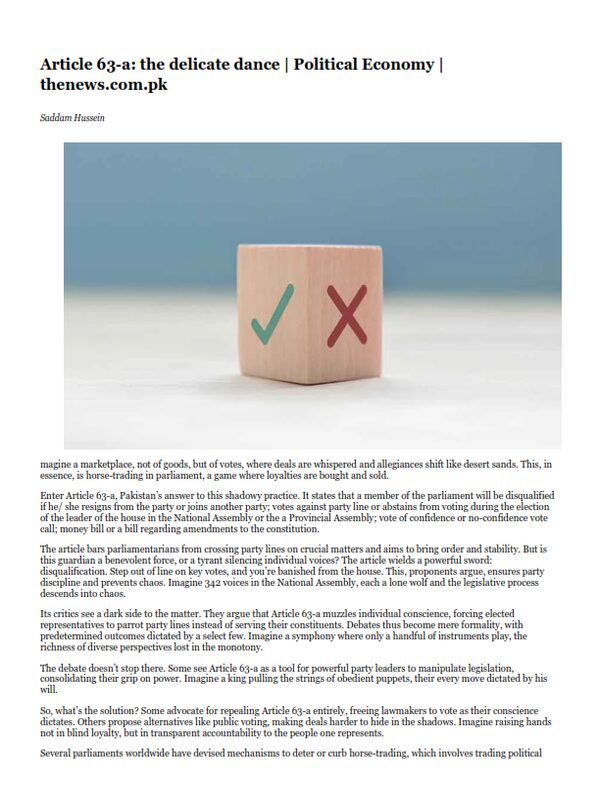
Pakistan Institute of Development Economics
- Home
Our Portals
MenuMenuMenuMenuMenuMenuMenu - ResearchMenuMenuMenuMenuMenuMenuMenu
- Discourse
- The PDR
- Our Researchers
- Academics
- Degree Verification
- Thesis Portal
- Our Portals
Article 63-a: the delicate dance
The fate of Article 63-a hangs in the balance; will it be retained, or will it be amended?
Imagine a marketplace, not of goods, but of votes, where deals are whispered and allegiances shift like desert sands. This, in essence, is horse-trading in parliament, a game where loyalties are bought and sold.
Enter Article 63-a, Pakistan’s answer to this shadowy practice. It states that a member of the parliament will be disqualified if he/ she resigns from the party or joins another party; votes against party line or abstains from voting during the election of the leader of the house in the National Assembly or the a Provincial Assembly; vote of confidence or no-confidence vote call; money bill or a bill regarding amendments to the constitution.
The article bars parliamentarians from crossing party lines on crucial matters and aims to bring order and stability. But is this guardian a benevolent force, or a tyrant silencing individual voices? The article wields a powerful sword: disqualification. Step out of line on key votes, and you’re banished from the house. This, proponents argue, ensures party discipline and prevents chaos. Imagine 342 voices in the National Assembly, each a lone wolf and the legislative process descends into chaos.
Its critics see a dark side to the matter. They argue that Article 63-a muzzles individual conscience, forcing elected representatives to parrot party lines instead of serving their constituents. Debates thus become mere formality, with predetermined outcomes dictated by a select few. Imagine a symphony where only a handful of instruments play, the richness of diverse perspectives lost in the monotony.
The debate doesn’t stop there. Some see Article 63-a as a tool for powerful party leaders to manipulate legislation, consolidating their grip on power. Imagine a king pulling the strings of obedient puppets, their every move dictated by his will.
So, what’s the solution? Some advocate for repealing Article 63-a entirely, freeing lawmakers to vote as their conscience dictates. Others propose alternatives like public voting, making deals harder to hide in the shadows. Imagine raising hands not in blind loyalty, but in transparent accountability to the people one represents.
Several parliaments worldwide have devised mechanisms to deter or curb horse-trading, which involves trading political favours or positions for support. For instance, New Zealand’s parliament employs the mixed-member proportional electoral system, blending constituency-based representation with proportional representation to encourage parties to seek broader voter support rather than relying solely on backroom deals.
For Pakistan, given the lack of political maturity and fragile democratic norms, show of hands in parliament, as an immediate strategy, could potentially restrict horse trading by enhancing transparency and accountability.
Likewise, Germany’s bundestag operates under a proportional representation system, fostering a similar incentive structure to discourage horse-trading. In Sweden, the riksdag uses proportional representation with a high electoral threshold, making it challenging for small parties to gain representation and reducing the likelihood of horse-trading.
Canada doesn’t have a specific electoral system tailored to combat horse-trading and the prevalence of minority governments has necessitated cooperation between parties, often formalised through confidence-and-supply agreements to provide stability while mitigating the risks of backroom deals. These examples illustrate diverse approaches taken by different countries to uphold democratic principles and minimise the influence of horse-trading in their parliamentary systems.
For Pakistan, given its lack of political maturity and fragile democratic norms, show of hands in parliament, as an immediate strategy, could potentially restrict horse trading by enhancing transparency and accountability. When members of parliament are required to publicly indicate their vote by raising their hands, it becomes difficult for them to engage in secretive horse trading, as their voting behaviour is visible to the constituents, the media and democracy watchdogs.
Such enhanced visibility can create social pressure on parliamentarians to vote in line with their professed principles and the interest of their constituents, rather than succumbing to the allure of unethical deals behind closed doors.
In parallel, implementing more robust measures such as strict regulations on lobbying, increased transparency in campaign finance and stronger enforcement of anti-corruption laws could help. These measures would aim to promote integrity, accountability and ethical conduct among parliamentarians, ultimately reducing the incentive and opportunity for horse trading to occur.
Article 63-a helps maintain party cohesion and prevent political instability by discouraging lawmakers from switching allegiance or going against the party line. This can enhance the effectiveness of government policies and ensure the smooth functioning of the legislative process. However, from the perspective of freedom of the lawmaker, the article can restrict the ability of legislators to exercise independent judgment, express dissenting opinions or represent the interest of their constituents if these positions conflict with the party’s stance. This limitation may undermine the democratic principle of representation, as lawmakers may feel compelled to prioritise party loyalty over their constituents’ needs or their own conscience.
The fate of Article 63-a hangs in the balance; will it be retained or will it be reformed or removed? The answer lies in the hands of parliamentarians who must understand the delicate dance between party loyalty and individual freedom. It’s about not just of rules and regulations, but power, representation and the very soul of democracy.
The writer is an institutional economist and political analyst, currently working as assistant chief of policy at Pakistan Institute of Development Economics, Islamabad.



